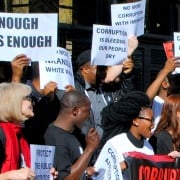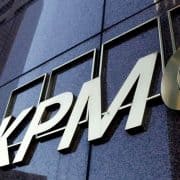|
Getting your Trinity Audio player ready...
|
By David Lewis
First published on Business Day
The survey on ethical practices in the auditing and related professions conducted by the Anti-Intimidation and Ethical Practices Forum (of which Corruption Watch is a founding member) is important precisely because of its focus on ethics.
The one principle of the rule of law that has been absorbed most deeply by those in power is that of “innocent until proven guilty”. The repeated invocation of this grates for two reasons.
First, because of the frequency with which it is invoked precisely by those who have so deeply corrupted our criminal justice system that the odds on them actually being charged — let alone found guilty — no matter how criminal their conduct, are extremely long.
Second, the “innocent until proven guilty” mantra suggests the only bar to holding high office in the public or private sectors, but most particularly the public sector, is a guilty finding in a criminal court, and even then, plenty of latitude is given. Ask Social Development Minister Bathabile Dlamini.
By focusing on ethics, this report suggests something quite different. It suggests, in the words of one standard definition of ethics, that there are “well-founded standards of right and wrong that prescribe what humans ought to do” and that adherence to these is a valid basis for judgment.
A conspicuous omission from the report is a definition of unethical conduct. It is indeed difficult to define and there are grey areas. When is a gift a bribe? When is lobbying key legislators the imparting of useful information to help them understand the complex issue before them? Or when is it wilful deceit, the exercise of undue pressure, or a necessary prelude to the offer of a bribe?
Maybe the best definitions are those that hold that if the question has to be asked whether a conduct is ethical or not, then it’s probably unethical. Or, the other well-known rule that if you would prefer not to have your conduct reported in the Sunday papers, then it’s best not to engage in it.
The report would have been greatly strengthened if it had framed questions that enabled us to know what the respondents considered to be unethical conduct.
So, what do we say of a large auditing firm comprised not only of an external audit practice, but also of a big internal audit practice; a management consultancy and forensic practice that was, through its consultancy arm, willing to doctor a report to serve the interests of an important client while causing grievous harm to other interests and society at large?
Would we agree that, because the provision of consultancy services is not subject to the same rules as auditing, that anything goes? Or, would we judge the whole firm by its woeful lack of ethical conduct. We should ask KPMG.
I’m pleased the members of the professions surveyed have such high regard for their professional bodies. We haven’t found all professional bodies to be so forthcoming.
We referred the conduct of a well-known law firm to one of the law societies. This firm’s conduct had been at the receiving end of a scathing high court judgment and there was a specific request by the court that its conduct be examined by the law society. Nothing had been done.
And so, we referred it to the relevant professional body, to discover that the lawyer concerned was an office bearer of the law society. To get a response to our referral, we had to threaten to take the society’s failure to enforce their rules on judicial review.
By then the lawyer had skipped the country.
Robust enforcement of the rules of professional bodies is especially important in a society where impunity reigns. Professional bodies have far-reaching sanctions in their armouries that could go some, if not all, of the way towards correcting for the country’s supine law enforcement authorities.
Acknowledging the failings of the criminal justice system, we are continuously engaged in a quest to identify punitive sanctions. Hence we are going to ask the court to find a number of former Eskom directors delinquent.
We are preparing a submission to the US department of justice, requesting that it investigate McKinsey’s conduct in SA, which on our reading is in gross contravention of the US Foreign Corrupt Practices Act.
We have submitted a complaint to the ombudsman’s office of the International Finance Corporation, arguing that it failed to comply with its own ethical standards when investing in Net1.
And we are closely watching the outcome of the Independent Regulatory Board for Auditors’ probe of KPMG’s auditing of Gupta accounts.
People from the private sector who take comfort from the judgment by the majority of respondents (including a majority of those working in the public sector) that the private sector is more ethical than the public sector should be aware the public does not necessarily share this view.
This is why we — and you — need to come down so uncompromisingly hard when professionals in self-proclaimed pillars of the private sector such as KPMG, McKinsey, Net1 and Bell Pottinger show the middle finger to society’s values.
These companies are, as former British prime minister Edward Heath once described Lonrho, the unacceptable face of capitalism.
If their faces are not to become the face of the private sector as a whole, then you need to take distance from them. While their legal licence may, for the time being, permit them to operate, they need to know there is also a social licence, and that can be withdrawn in the court of public opinion where the standard of proof is lower and the expectation of minimum acceptable conduct is higher than that demanded by a criminal court.
• This is an extract of the keynote speech delivered by David Lewis, Corruption Watch executive director, at the launch by the Anti-Intimidation and Ethical Practices Forum of the Ethical Practices Survey.








